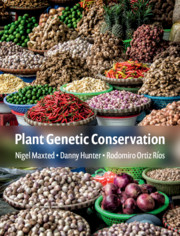Book contents
- Frontmatter
- Frontispiece
- Contents
- Foreword
- Preface
- Acknowledgements
- Part I Introduction
- Part II Scientific Background
- Part III Conservation Practice
- Part IV Plant Exploitation
- 14 Plant Uses
- 15 Germplasm Evaluation
- 16 Plant Breeding
- 17 Participatory Plant Breeding
- 18 Conservation Data Management
- Acronyms and Abbreviations
- Glossary
- References
- Index
- Plate section
15 - Germplasm Evaluation
from Part IV - Plant Exploitation
Published online by Cambridge University Press: 05 September 2020
- Frontmatter
- Frontispiece
- Contents
- Foreword
- Preface
- Acknowledgements
- Part I Introduction
- Part II Scientific Background
- Part III Conservation Practice
- Part IV Plant Exploitation
- 14 Plant Uses
- 15 Germplasm Evaluation
- 16 Plant Breeding
- 17 Participatory Plant Breeding
- 18 Conservation Data Management
- Acronyms and Abbreviations
- Glossary
- References
- Index
- Plate section
Summary
Knowledge regarding gene bank accessions characters facilitates the identification of the most promising for future use. Sampling of accessions from a cultigen available at a gene bank may be based on diversity and variability analysis relying on characterization or evaluation data, DNA markers, or both. Core subsets may aid selection by guiding users to genetic differences. Evaluation results must be shared promptly and widely worldwide, so germplasm users can request them for further utilization in plant breeding or research on plant genetic resources. This chapter relates therefore to gathering accurate and precise evaluation of diverse accessions in well-designed trials. Such knowledge is essential for identifying the most relevant accessions for further use. This information needs to be shared widely and quickly with users to achieve a maximum impact because any germplasm user should be aware of the potential of gene bank accessions in order to fully exploit such plant genetic resources.This chapter also illustrates the need for an objective assessment of gene bank accessions, deals with sampling of core subsets for evaluation of gene bank accessions, explains the principles of experimental design for trials of gene bank accessions and provides basic knowledge regarding trial data analysis.
Keywords
- Type
- Chapter
- Information
- Plant Genetic Conservation , pp. 428 - 442Publisher: Cambridge University PressPrint publication year: 2020

